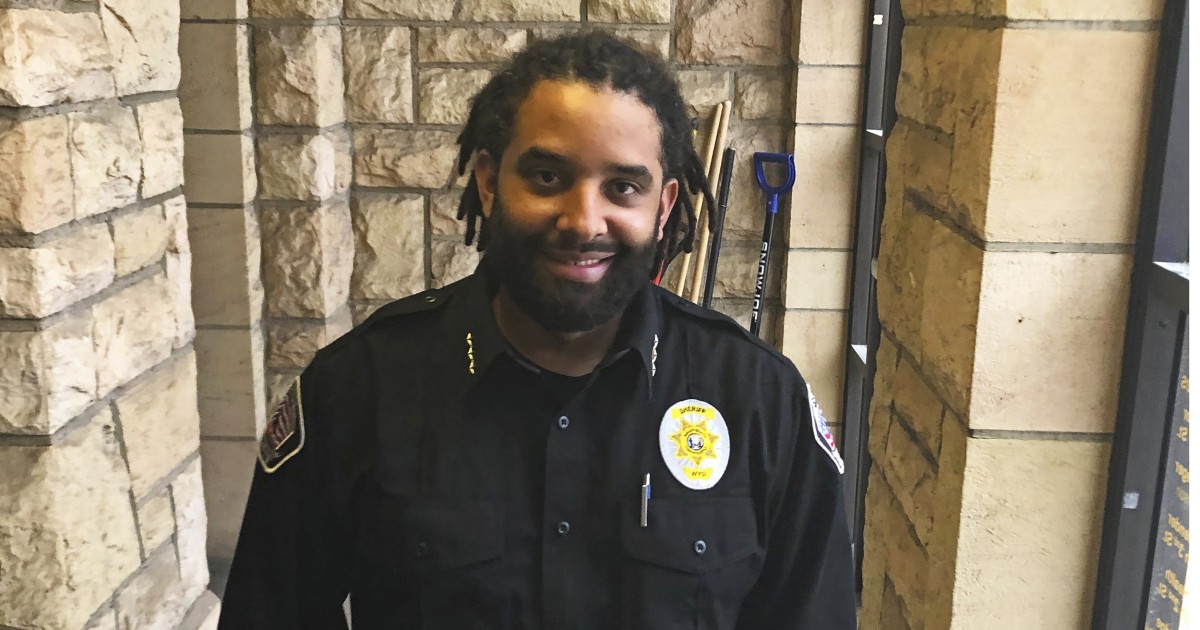LARAMIE, Wyo. (AP) – As a student at the Wyoming Law Enforcement Academy, Aaron Appelhans used to look at pictures of past graduates’ classes hanging on the wall.
“I could see, for the most part, there aren’t many people who looked like me around here,” he recalled the mostly white faces.
A decade later, Appelhans was named Wyoming’s first black sheriff, a position he took months after the rage for racist policing stirred up American cities. His territory includes one of Wyoming’s last Democratic strongholds, but the state is predominantly conservative and white and he has already faced racist comment from a lawmaker.
This did not surprise him. Wyoming has made progress, but remains “very racist,” said Stephen Latham, president of the NAACP state.
As in other parts of the country struggling with police violence, a policeman shooting an unarmed and mentally ill man played an important role in the appointment of Appelhans as sheriff of Albany County. The death of Robbie Ramirez, 39, during a traffic stop two years ago, sparked a violent reaction that extended to protests last summer because of racial injustice and police brutality.
Albany County for Proper Policing formed after the shooting and pressured Appelhans to take over when their predecessor, Dave O’Malley, retired.
“We are going to take this anger and pain and make it progress in our community,” said state deputy Karlee Provenza, the group’s executive director.
Appelhans, 39, grew up near Denver, suffering from racism and had relatives in the criminal justice system. He understands both sides of the Black Lives Matter movement, he told the Associated Press recently.
“I am one of those people who really feel that the police really need to take a good look at what we do,” said Appelhans. “Are we serving our community?”
A former sergeant in the University of Wyoming Police Department, Appelhans became the top police officer in a county in December more than three times the size of Rhode Island, but with only 650 African Americans among 39,000 people.
The county seat is Laramie, home to the University of Wyoming and a liberal city still associated with the murder of gay student Matthew Shepard in 1998. Ramirez’s murder 20 years later attracted less attention, but a new examination of conscience.
A grand jury refused to indict sheriff deputy Derek Colling for shooting Ramirez. Colling, who grew up in Laramie and knew Ramirez from school, killed two people as a Las Vegas cop before being fired there.
A lawsuit accuses Colling of killing Ramirez unnecessarily. He claims that O’Malley, the former sheriff, ignored Colling’s “wild temper” and hired him partly because his father was a friend.
Appelhans declined to talk about Colling or the shooting, citing the department’s policy of not commenting on pending litigation.
He hopes, however, that funding for donations and working with local groups will mean less confrontation.
“We have ‘cops’ as a nickname,” said Appelhans. “We are not ‘policemen’. I am listed, like any other deputy here, as a peace officer. We are here to keep the peace. And this is really one of the big changes where I wanted to focus on law enforcement. “
His work with the university force to try to reduce crimes such as sexual assault was encouraging, said Provenza, the lawmaker who helped local Democrats veto candidates for the sheriff.
“There are many opportunities for the sheriff’s office to grow and change and evolve into something that this community feels most secure in working with,” said Provenza.
Leadership training and Appelhans’ experience as a detective and in crime prevention point to “likely success” as a sheriff, said University of Wyoming police chief Mike Samp.
O’Malley, however, said the Democrats had not appointed anyone qualified as a sheriff. Reached in Florida, where he now lives, O’Malley said, “I think he’s going over the top, but, you know, it’s yet to be seen.”
Since O’Malley was a Democrat, the Albany County Democratic Party recommended three finalist sheriffs to the county commission, but not O’Malley’s principal choice, an undersecretary.
O’Malley declined to comment on Ramirez’s shooting or the lawsuit. Colling did not return a message and his lawyer declined to comment.
Ramirez’s relatives and lawyers did not return messages asking for comment on Appelhans’s appointment.
Appelhans said he was not sure he wanted to be a sheriff because he will need to campaign next year to keep his job. The rare chance to run a law enforcement agency and reform has changed his mind, he said.
In December, Republican state deputy Cyrus Western responded to the news of Appelhans’ nomination by posting an online clip that showed a black character from the film “Blazing Saddles” asking, “Where are the white women?” In the film, an ex-slave serves as the sheriff of an all-white city.
Western publicly apologized over the phone to Appelhans.
“It was one of the things that I knew would come with the territory to get that job,” said Appelhans. “I don’t look like everyone else, I don’t think like everyone else. Some people are going to have some problems with this, just based on how I look. This is a problem in America ”.
Wyoming’s capital and largest city, Cheyenne, had its first black police chief, James “Jim” Byrd, in 1966. But considering people of color for the most important law enforcement positions remains the exception, not the standard practice, Latham said with the Wyoming NAACP.
“You have to bring it to their mind and then they start thinking about it. But these days, it shouldn’t be something that is in the background, ”said Latham.
